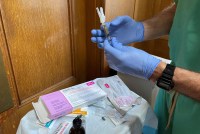Latest KFF Health News Stories
Georgia’s Medicaid Work Requirements Costing Taxpayers Millions Despite Low Enrollment
Republican Gov. Brian Kemp’s Georgia Pathways to Coverage program has seen anemic enrollment while chalking up millions in start-up costs — largely in technology and consulting fees. Critics say the money’s being wasted on a costly and ineffective alternative to Obamacare’s Medicaid expansion.
Needle Pain Is a Big Problem for Kids. One California Doctor Has a Plan.
The pain and trauma from repeated needle sticks leads some kids to hold on to needle phobia into adulthood. Research shows the biggest source of pain for children in the health care system is needles. But one doctor thinks he has a solution and is putting it into practice at two children’s hospitals in Northern California.
Under Fire for Massive Health System Hack, Biden Team Leans on Insurers
The Biden administration has hit on a strategy to deal with the massive, industry-paralyzing cyberattack on a UnitedHealth Group unit: pressuring insurers to fix it. Federal officials have been in constant conversation with senior leaders at UnitedHealth and across the industry, including at a Monday meeting where Department of Health and Human Services and White […]
Cuando tu cobertura de salud dentro de la red… simplemente se esfuma
los contratos de las aseguradoras con médicos, hospitales y farmacéuticas (o sus intermediarios, los llamados administradores de beneficios farmacéuticos) pueden cambiar abruptamente de la noche a la mañana.
When Copay Assistance Backfires on Patients
Drugmakers offer copay assistance programs to patients, but insurers are tapping into those funds, not counting the amounts toward patient deductibles. That leads to unexpected charges. But the practice is under growing scrutiny.
How Your In-Network Health Coverage Can Vanish Before You Know It
One of the most unfair aspects of medical insurance is this: Patients can change insurance only during end-of-year enrollment periods or at the time of “qualifying life events.” But insurers’ contracts with doctors, hospitals, and pharmaceutical companies can change abruptly at any time.
What the Health? From KFF Health News: Maybe It’s a Health Care Election After All
Health care wasn’t expected to be a major theme for this year’s elections. But as President Joe Biden and former President Donald Trump secured their respective party nominations this week, the future of both Medicare and the Affordable Care Act appears to be up for debate. Meanwhile, the cyberattack of the UnitedHealth Group subsidiary Change Healthcare continues to do damage to the companies’ finances with no quick end in sight. Margot Sanger-Katz of The New York Times, Anna Edney of Bloomberg News, and Joanne Kenen of Johns Hopkins University and Politico Magazine join KFF Health News’ Julie Rovner to discuss these issues and more. Also this week, Rovner interviews Kelly Henning of Bloomberg Philanthropies about a new, four-part documentary series on the history of public health, “The Invisible Shield.” Plus, for “extra credit” the panelists suggest health policy stories they read this week that they think you should read, too.
Exclusive: Social Security Chief Vows to Fix ‘Cruel-Hearted’ Overpayment Clawbacks
New Social Security Commissioner Martin O’Malley is promising to change how the agency reclaims billions of dollars it wrongly pays to beneficiaries, saying the existing process is “cruel-hearted and mindless.”
Ya hay una droga oral para la depresión postparto… pero cuesta $16,000
Abogados, defensores y reguladores están observando de cerca cómo las aseguradoras diseñarán las normas para cubrirlo.
Concerns Grow Over Quality of Care as Investor Groups Buy Not-for-Profit Nursing Homes
For-profit groups own more than 70% of U.S. nursing homes. Industry leaders and researchers wonder whether corporations and investors can succeed where not-for-profit organizations have struggled. Or, will quality of care suffer in the name of making money?
Movimientos en contra de las vacunas perjudican a los niños más vulnerables
La desinformación, junto con un movimiento por el derecho de los padres que aleja la toma de decisiones de la salud pública, ha contribuido a las tasas de vacunación infantil más bajas en una década.
How the Anti-Vaccine Movement Pits Parental Rights Against Public Health
Framed in the rhetoric of choice, Tennessee’s new law governing childhood vaccinations is among more than a dozen recently passed or pending nationwide that set parental freedom against community and children’s health.
A New $16,000 Postpartum Depression Drug Is Here. How Will Insurers Handle It?
A pill form of an effective drug for postpartum depression hit the market in December, but most insurers do not yet have a policy on when or whether they will pay for it. The hurdles to obtain its predecessor medication have advocates worried.
Colorado Isn’t Giving up on Its Drug Importation Dream
Colorado hopes to join Florida to become only the second state authorized to import prescription drugs from Canada. But they’re hitting the same hurdles: drugmakers — and the FDA. Colorado officials recently amended their 2022 importation application with the Food and Drug Administration, in the process revealing new correspondence that shows the state’s so-far fruitless […]
En 2022, el año más reciente del que se dispone de datos, 7,385 californianos murieron por sobredosis relacionadas con opioides, de los cuales el 88% involucró fentanilo, un opioide sintético que puede ser 50 veces más potente que la heroína.
VIP Health System for Top US Officials Risked Jeopardizing Care for Soldiers
The historically troubled White House Medical Unit is just one part of a government health system that gives VIP care to top officials, military officers, military retirees, and families. Pentagon investigators say some were prioritized over rank-and-file soldiers.
Biden Team, UnitedHealth Struggle to Restore Paralyzed Billing Systems After Cyberattack
The cyberattack on a unit of UnitedHealth Group’s Optum division is the worst on the health care industry in U.S. history, hospitals say. Providers struggling to get paid for care say the response by the insurer and the Biden administration has been inadequate.
Operating in the Red: Half of Rural Hospitals Lose Money, as Many Cut Services
A recent report finds half of America’s rural hospitals are losing money, and many are struggling to stay open. Researchers and advocates worry the hospitals’ financial spiral will have immediate and long-term health effects on their communities.
Why Hospitals in Many States With Legal Abortion May Refuse To Perform Them
Many states that tout themselves as protectors of reproductive health care, including California, Michigan and Pennsylvania, have little-noticed laws on the books protecting hospitals that refuse to provide it. The laws shield at least some hospitals from liability for not providing care they object to on religious grounds, leaving little recourse for patients. The providers — many of them […]
Statistical Models vs. Front-Line Workers: Who Knows Best How to Spend Opioid Settlement Cash?
A mathematical model designed to direct spending of opioid settlement funds is at the center of a debate over whether to invest in technology to guide long-term decisions or focus on the immediate needs of people in addiction.





















